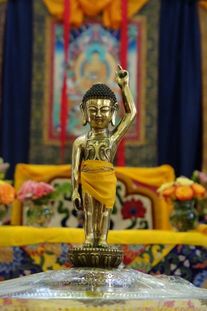A commentary on a Sutra regarding making offerings, such as offering bathing water, to stupas and Buddha’s image, by Ven. Gyalten Tsondue
The essential way of describing the Buddhist path is in terms of the threefold category of view, meditation and activity. View refers to cultivating a right understanding of both the conventional and ultimate levels of truth. Meditation indicates the process of familiarizing one's mind with the object of the meditation, which in Buddhism is frequently a positive state of mind. Activity is part of the method side of the training - to refrain from negative activities, purify negative karma, accumulate merit, and benefit others. Ritual occupies a significant place on the method side as a part of Buddhist training, particularly in terms of purification.
The purification of negative karma with the help of rituals is heavily dependent upon how heavy our past negative karma is in the first place. Two different people, suffering the same problem, each carry a different karmic gravity, and the same ritual performed by both of them can have different results for each of them.
Yet, regardless of previous karmic gravity, the result of performing purification rituals is certainly positive and beneficial. A ritual puja can serve on many different levels to help us. It can help you to collect a great deal of merit, which will allow you to be able to solve many problems for yourself, in the most beneficial way. It could even be that rituals help to create positive karma for you to find the right situations, people, and resources to assist you in overcoming any particular problem you are facing. It could also lead to you connect with the right and genuine spiritual master.
Trusol, in Tibetan, is a sacred ritual of ‘bathing’ the Buddha and other holy images. Various forms of this rite are practiced in most Buddhist countries. Tibetans generally practice it in reliance upon procedures and liturgies coming directly from classical Buddhist India.
It should be pointed out that the practice is undertaken with the understanding that these ‘objects’ are transcendental beings, and they, therefore, have no impurities to be washed away. Nonetheless, in ancient India bathing was considered to be a pleasant source of enjoyment, and, thus, to offer a bath was regarded as auspicious. The impurities to be cleansed then are associated with the practitioner performing the rites, not the transcendental beings.
In the spiritual sense, dirt and impurities refer to the inner defilements, and to the negative karmic residues collected through body, speech and mind. Hence, they are inner afflictions and impurities, and these cannot be removed by water or other elements. This is a basic Buddhist thought and understanding. In important Buddhist commentaries on logic, non-Buddhist belief systems come under severe criticism for their belief in the efficacy of physical bathing in holy rivers and the like to purify inner defilements. In Buddhism, inner purification is accomplished by the cultivation of inner meritorious energy. Thus, the merit accumulated by engaging in the sacred bath offering to the Buddha image or other holy objects is the force which purifies the practitioner of his or her inner impurities.
A Bathing Ritual can be done at new premises to clear out negative energies or beings. It should be done at old premises also to bless the environment and all objects within. It is a great way to purify a premise with a gentle and simple method.
Some of the benefits of performing the ritual are as follows:
- Wealth and happiness, good health and longevity
- All wishes (with the right motivation) are fulfilled
- Peace and harmony for family, relatives, friends, country and world
- Never to face the Eight Obstacles of learning the Dharma
- No sickness or suffering
- Achieve Enlightenment
For the ritual to be a karmic cause of purification and accumulation of merit, it is important that it be performed with the correct motivation. When Bathing the Buddha, one should:
- Have faith and be joyful in the merit of bathing the Buddha. In pouring the fragrant water, we are also cleansing our own minds.
- Have sincerity. We should believe that the Buddha is actually present in front of us and we have cultivated the premiere merit in the world. We should dedicate this merit to all sentient beings to enhance their wisdom and to create a close bond with the Buddha.
- Be righteous by wishing to be rid of our karmic obstructions and purify our minds. We should also pray for peace and happiness for all humanity.
In the sutra, Buddha said:
After my passing away,
you will be able to honor my relics.
Some will build stupas
or images of the Tathagata.
At the place of the image or stupa,
one who anoints that spot of ground
with various incenses and flowers,
scattering them over its surface
uses pure, beautifully scented water
to pour onto the body of this image,
offers it various flavorful drinks and foods,
fully maintaining it with oblations,
eulogizes the virtue of the Tathagata,
which is endlessly difficult to conceive;
through the wisdom of skillful means
and the supernatural power of the Buddha
such a one will quickly reach the other shore of Nirvana.
He will obtain the diamond body
complete with the thirty-two marks of a great person
and the eighty minor signs of excellence.
He will ferry the multitude of living beings
to the shore of Nirvana.
VGT/gd


 RSS Feed
RSS Feed
